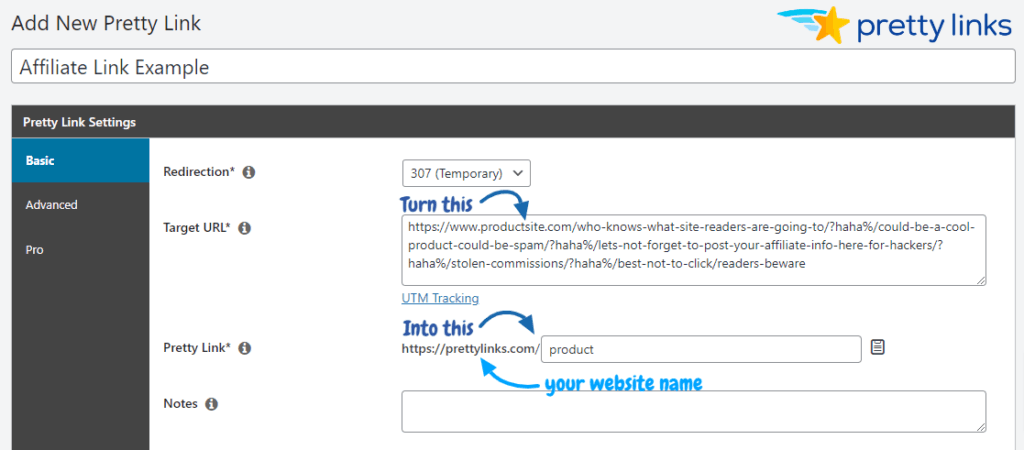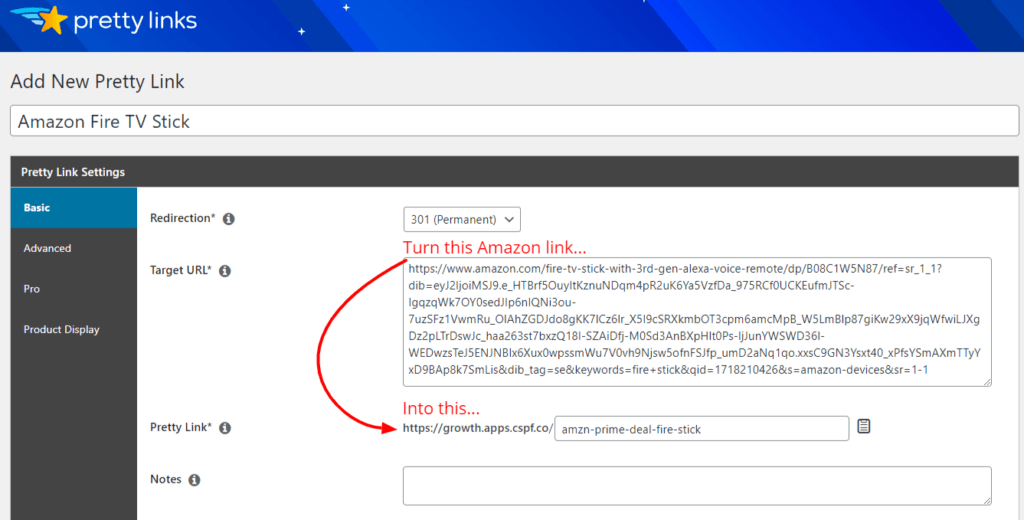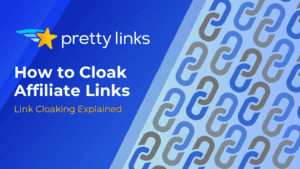Contents
We’re debunking the biggest, most outdated link shortening myths that might be holding you back. Learn how affiliates today confidently use branded short links to build trust, track clicks, and grow revenue!
In the early days of affiliate marketing, short links got a bad reputation. Basic tools like Bitly and TinyURL were built for quick shares and convenience – not long-term commissions. They didn’t offer tracking you could trust, links could break without warning, and some platforms treated shortened URLs with suspicion.
Those early experiences shaped many of the link shortening myths still circulating today. But affiliate marketing (and the tools we use to do it) have come a long way.
PrettyLinks is a modern link management platform purpose-built for today’s affiliates. Our plugin does more than just shorten links – it protects commissions, tracks performance, brands your URLs, and gives you full control over how you drive conversions.
If you’re still steering clear of short links because of something you heard back in 2013, you’re probably working harder than you need to. Let’s break down the biggest myths still floating around and clear up what link shortening can do for your strategy today.
What is Link Shortening?
Link shortening is exactly what it sounds like: turning a long, complicated URL into something shorter, cleaner, and easier to share.
It became increasingly popular when social media platforms introduced strict character limits. Long affiliate URLs simply didn’t fit, especially in places like tweets or Instagram bios.
The History Behind Short Link Skepticism
As marketers began sharing more links online, they needed a way to track where traffic was coming from. This led to the rise of UTM tagging; which is useful for analytics, but it makes URLs even longer and more cluttered. Here’s one for example:
https://yourbrand.com/affiliate-product?utm_source=facebook&utm_medium=social&utm_campaign=link-category
To solve that, services like TinyURL began offering simple link shortening. You pasted in your long URL, and it gave back something shorter and compact. It worked…at least for basic use.
Soon after, dozens of similar tools hit the market, including built-in shorteners from platforms like Twitter (now X) and Google, generating links that looked more like this:
- https://t.co/abc123 (X)
- https://goo.gl/xyz789 (Google)
As you can tell by those examples, early shorteners were never designed for affiliate marketers. They offered minimal tracking, no branding options, and zero protection if a link broke or a destination changed. On top of that, some platforms began flagging shortened links as spammy or untrustworthy.
And that’s where most of the myths started. Back then, short links really did come with issues – so it’s no surprise that marketers became skeptical. But even as the technology evolved, the reputation stuck.
Today, things look very different – and that’s what we’re here to clear up!
7 Link Shortening Myths (and Why They’re False)
Let’s break down some of the biggest link shortening myths still floating around and get clear on what’s actually true when you’re using PrettyLinks to shorten your affiliate links.
Myth 1: Short Links Look Suspicious
Why It’s False: Short links only seem shady when they’re generic and unbranded. When you use your own domain and customize the link, it builds trust and gets more clicks.
It’s not wrong for readers to click cautiously. Random links like bit.ly/3xT2kP or tinyurl.com/9k8fj7 give zero context, use someone else’s domain, and offer no hint about where they lead. That kind of mystery makes people hesitate – and hesitation costs you clicks and commissions.
PrettyLinks changes that. Every link you create is branded to your own domain and can be customized to clearly reflect the content or affiliate offer behind it, such as: yourbrand.com/affiliate-product

It’s a small change that makes a big difference. A branded, descriptive link looks more professional and instantly builds credibility. And when people trust your link, they’re far more likely to click.
Myth 2: Shortened Links Hurt SEO
Why It’s False: SEO comes down to how your links are redirected – not the fact that they’re shortened.
This particular link shortening myth comes from confusion about how SEO works. Shortened links only become an SEO issue when they use the wrong type of redirect.
Search engines rely on redirect types to understand how link equity (or “link juice”) should flow. If your short link is using a temporary redirect, that SEO value might not pass through to the destination page.
That’s where 301 redirects come in. A 301 tells search engines the destination is permanent and passes ranking signals like page authority and relevance. If you’re shortening affiliate links that point to stable offers or evergreen content, a 301 is the way to go.
PrettyLinks supports multiple redirect types, so you can choose what works best for your strategy:
- 301 Permanent – Best for SEO. Passes link equity. Ideal when the destination URL isn’t expected to change.
- 302 Temporary – Used when the destination might change, but behavior can vary between browsers and search engines.
- 307 Temporary – Also for changing destinations. SEO-safe if used with the nofollow attribute to avoid indexing.
By default, PrettyLinks uses 307 redirects with the “nofollow” attribute applied. But if SEO value matters for a specific link, you can easily switch it to a 301 redirect – giving you full control over how your link behaves in search.
Myth 3: Short Links Aren’t Secure
Why It’s False: If anything, short links are safer. They help you prevent link tampering, reduce spam flags, and stay independent from third-party platforms that can shut down without warning.
Let’s start with tampering. Shortening a link doesn’t expose your affiliate ID or tracking data. The redirect simply forwards the click to your full affiliate URL, where all referral tracking still takes place. If someone wanted to hijack your commissions, they’d have to manipulate the original destination – not the short link itself.
That being said, a short link can actually protect your affiliate ID by hiding sensitive parameters from being copied, edited, or overwritten.
Next up: the spam factor. Generic short links often raise red flags because they offer no context and use a shared domain. But when you brand your links using your own domain, they instantly look more credible and professional. That trust signal helps your content avoid spam filters or platform blocks.
Lastly, control. Free link shorteners come with a catch: you’re relying on a third-party platform. If their system goes down, changes policies, or removes inactive links, your entire network of URLs could break.
With PrettyLinks, everything runs on your own WordPress site. You manage the redirects, you own the data, and you stay in control – no matter what.
Myth 4: Amazon Associates Can’t Use Short Links
Why It’s False: Amazon doesn’t ban link shortening – it bans deceptive cloaking that hides the destination. As long as your redirect is transparent, you’re in the clear.
This myth trips up a lot of affiliates, and understandably so. Amazon’s affiliate program (Amazon Associates) especially warns against “cloaking” and “misleading redirects,” which makes it sound like any kind of short link is off-limits.
But shortening isn’t the problem – deception is. In fact, Amazon has its own link shortening tool to help you create short, shareable links. So clearly, the act of shortening a URL isn’t the issue.
What Amazon prohibits is hiding the fact that a link leads to Amazon. Cloaking becomes a problem when a product link is layered through redirects, masked behind vague slugs, or deliberately designed to obscure the destination.
But a branded redirect that clearly points to an Amazon product? That’s completely fine!
With PrettyLinks, your short links stay clean, branded, and fully transparent. A URL like yourbrand.com/amazon/fire-stick gives context, builds trust, and still sends the user directly to Amazon – without hiding a thing.

As long as you’re being clear about where your link leads, you’re playing by the rules.
Myth 5: Short Links are Only Useful for Social Media
Why It’s False: Short links aren’t just for squeezing into social post – they belong anywhere you share affiliate content.
Another one of those lingering link shortening myths is that they’re only for social media. Social media might be where short links get the most attention, but they’re just as useful in long-form content.
From blog posts to email newsletters to lead magnets, a short URL is easier to spot, easier to remember, and far more likely to convert.
- Blog posts – Even when your links are anchored to keywords, what shows on hover still matters. A clean, branded URL helps your content look more polished and trustworthy.
- Email marketing – Raw affiliate links can look suspicious to both spam filters and subscribers. A simple, branded short link is more likely to make it through and earn a click.
- YouTube – Viewers are here to watch, not read. They either want to hear your link or quickly spot it in the description. A short, branded URL is easier to say, faster to find, and more likely to get clicked without interrupting the viewing experience.
- Podcast show notes – Short links are easier to say during an episode and easier for listeners to remember and type in later.
- PDFs, downloads, and lead magnets – Once you send a file (like an ebook), it’s out there. Using a versatile short link means you can change where it points anytime — without needing to edit or re-upload the orginal.
- Webinars and live presentations – A clean, branded link is easy to read on a slide and simple for viewers to type on the spot.
No matter where you publish, short links give you cleaner content, better usability, and more flexibility across every channel you use to earn.
Myth 6: You Can’t Track Performance on a Short Link
Why It’s False: Short links still carry all your tracking data and can even make it easier to measure performance at a glance.
Some affiliate marketers worry that using a short link might interfere with referral data or tracking. But shortening a URL doesn’t disrupt analytics for either side. In other words:
- Your affiliate program still sees the conversion (so you still get paid).
- You get all the data you need without cluttering your content with raw URLs and UTM strings.
And when you shorten and manage your links with PrettyLinks, tracking isn’t an afterthought – it’s built in. You can see exactly how each link is performing, including:
- How many clicks you’re getting
- Where those clicks are coming from (location, device, referrer)
- Which content or campaigns are driving traffic
- Which offers or products are converting the best
If you want to go even further, PrettyLinks integrates with MonsterInsights for a simplified view of Google Analytics, helping you connect your link performance to your broader affiliate strategy.
Myth 7: All Link Shorteners are the Same
Why It’s False: Most shorteners just shrink your URL. PrettyLinks gives you more control, better branding, and data that actually helps you earn.
At first glance, link shorteners all seem to do the same thing – turn a long URL into something more manageable. But if you’re using links to grow your income, you need more than a quick redirect.
With PrettyLinks, you can also:
- Use your own domain to build trust and brand recognition
- Customize every URL to match your content or offer
- Track clicks and conversions with detailed, actionable data
- Organize and manage links from one central dashboard
- Unlock advanced tools like A/B testing, geo-targeting, and link expiration
This link shortening myth is especially dangerous because it makes people second-guess valuable tools. As we’ve listed here, all link shorteners are not created equal. And treating them like they are could cost you clicks, valuable data, and potential conversions.
If you’re relying on affiliate links to grow your revenue, you need more than basic – you need PrettyLinks, a tool built for what comes after the click!
Conclusion
We’ve busted the biggest link shortening myths and here’s the bottom line: short links aren’t something to avoid. They’re what every affiliate marketer should be using.
A shorter link might seem like a small cosmetic improvement, but it directly impacts how your audience reacts. Clean-looking URLs are more likely to be trusted, clicked, and ultimately turn views into revenue.
With PrettyLinks, shortening your URLs is just the beginning. You also get branded links that look polished in any context, built-in tracking that shows you exactly what’s working, and a clean, central place to organize, update, and optimize every link you share.
Think back to your early affiliate days…Were your links more “professional brand” or “hot mess express”? Share your PrettyLinks glow-up story in the comments!
Let’s stay connected! Follow us on Facebook, Twitter, Pinterest, LinkedIn, and YouTube for more tips, tricks, and insights. And, don’t miss out on our exclusive content – subscribe to our newsletter today! 📬









Leave a Reply